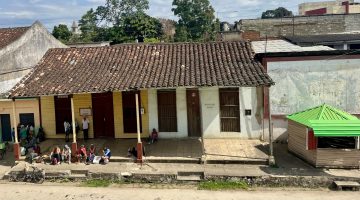The Asilo — Day Center for the Elderly
Objectif
800€
Responsable du projet
Sister Rosario, from the Servants of Jesus congregation
Nombre de bénéficiaires
14
Le projet
Localisation
Gallerie
Le projet
Every weekday morning, Jorgito rides through the city on his three-wheeled bicycle to pick up, directly from their homes, the people cared for at the Asilo.
The two sisters from the Servants of Jesus congregation welcome each person with breakfast, then help them with their daily care and take care of their laundry.
The mornings unfold in a family atmosphere: some help with household chores (meal preparation, cleaning rice, doing laundry, hanging clothes…), while others prefer to relax, play dominoes, read, or enjoy the garden.
The Asilo is a lively and open place: volunteers regularly come to spend time with the residents, share their skills, help in the kitchen, or offer small services such as haircuts.
At noon, the sisters and volunteers work together to prepare and serve lunch.
In addition to the 14 semi-residents who spend the day at the Asilo, around twenty people living in very precarious conditions wait outside with their containers to receive a meal.
Each week, the sisters serve more than 200 meals.
After lunch, everyone enjoys a moment of rest — a nap in a rocking chair, a movie, or a game of dominoes.
At the end of the day, the residents are taken back home, with a carefully prepared dinner and clean clothes.
L'histoire du projet
Faced with the growing number of people living in extreme poverty — especially elderly people left alone, without financial support or family, and often unable to live independently — three sisters from the Servants of Jesus congregation, encouraged by the priests of the Mission, accepted the call to take charge of the Asilo project.
In 2007, the Asilo opened its doors to welcome about twenty semi-residents.
This initiative responds to a painful reality: the pension provided by the State is not enough to live with dignity, and the massive wave of emigration has left many elderly people isolated, without family or support.



